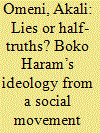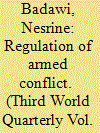| Srl | Item |
| 1 |
ID:
185519


|
|
|
|
|
| Summary/Abstract |
Using Social Movement Theory (SMT) as a methodological framework and explicitly employing the core SMT concepts of political opportunism and framing, this paper seeks to examine Boko Haram's use of discourse in activism. As a rarely employed research method within the Boko Haram literature, SMT holds explanatory power around the movement's approach to transforming motivation potential into actual mobilisation via frame resonance. Focusing on the application of framing within (interpreted) sermons, lectures and exhortations by both Muhammad Yusuf and Abubakar Shekau as former substantive leaders of Boko Haram, this paper unpacks the discourse of Boko Haram's ideology. The paper shows that this ideology, which contrasts the softened core of the Salafist/Wahhabi doctrines from which Boko Haram broke away, relies on problematic interpretations of Qur’ānic exegesis and political thought as both relate to faith and governance in northern Nigeria. One policy recommendation to emerge from this study is that counter-narratives to Boko Haram's ideology should highlight not just why but also how the group's rhetoric employs lies and half-truths in an attempt to rationalise its activism; despite what appears to be an adherence to Qur’ānic exegesis, in making its claims.
|
|
|
|
|
|
|
|
|
|
|
|
|
|
|
|
| 2 |
ID:
148280


|
|
|
|
|
| Summary/Abstract |
This paper calls for comparative analysis of international humanitarian law and Islamic laws regulating armed conflict by focusing on the underlying assumptions and interests informing both systems (rather than on rule-based comparison). It argues that examination of the biases inherent to each legal system can potentially inform scholars to understand better the paradigms shaping each of them. In doing so, the paper builds on contextual and critical interpretations of both fields of law to assert the need for ‘critical comparativism’ rather than functionalist comparativism. Unlike functionalist comparativism, which treats international law as the ‘objective’ benchmark against which other legal traditions are measured, ‘critical comparativism’ treats the two legal systems examined as alternative manifestations of power structures which, when contrasted against each other, help shed more light on the inherent bias in each legal system.
|
|
|
|
|
|
|
|
|
|
|
|
|
|
|
|